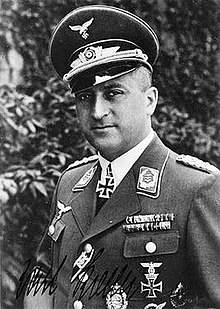Karl Koller (general)
| Karl Koller | |
|---|---|
 |
|
| Born |
22 February 1898 Glonn, Bavaria |
| Died | 22 December 1951 (aged 53) Glonn, Bavaria |
| Allegiance |
|
| Service/branch |
|
| Years of service | 1914–45 |
| Rank | General der Flieger |
| Commands held | Chief of the Luftwaffe General Staff |
| Battles/wars | World War I, World War II |
| Awards | Knight's Cross of the Iron Cross |
| Other work | Der Letzte Monat (memoirs) |
Karl Koller (22 February 1898 – 22 December 1951) was a German General der Flieger and the Chief of the General Staff of Nazi Germany's Luftwaffe during World War II.
Koller was born in Glonn in Bavaria. He enlisted in the army in 1914 and, after infantry service, transferred to aviation. He passed pilot training in 1916 and flew in observation and fighter squadrons, being captured by the British in May 1918. Following release in 1919 he served in various police capacities, shifting to the Luftwaffe in 1935. An exemplary officer, in 1936 Koller graduated valedictorian at the Air War Academy. He was the Chief of Staff for Hugo Sperrle during the Blitz. For Operation Sea Lion, the planned invasion of the United Kingdom by the Wehrmacht, Oberstleutnant Koller was to serve as the Operations Officer of Luftflotte 3, in coordination with the German 9th Army. Koller became the Chef der Luftwaffenführungsstabes ("Chief of the Luftwaffe Operations Staff") in October 1943, which essentially made him as assistant to the General Staff.
Dissatisfied with Hermann Göring's leadership of the Luftwaffe, Adolf Hitler wanted to replace him with Robert Ritter von Greim. Unable to convince Greim to accept the role, Hitler forced Göring to sack the Chef der Generalstabs der Luftwaffe ("Chief of the General Staff of the Luftwaffe"), Generalleutnant Werner Kreipe, and provisionally replace him on September 19, 1944 with the stolid Koller, who was officially assigned the position on November 12. However, Koller was unable to reform the Luftwaffe, which had been mismanaged by Göring and had lost air superiority over the skies of Europe. Koller explained the problem the Luftwaffe had dealing with the other service branches:
...
Wikipedia
